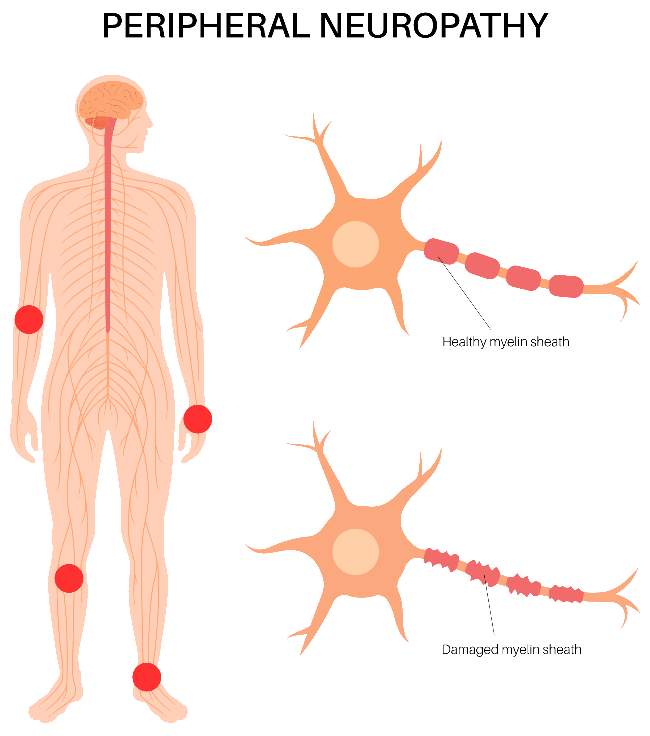Neuropathy Pain
Treatment for Neuropathy Pain Relief
Neuropathy, commonly referred to as peripheral neuropathy, is a condition that affects the peripheral nerves, leading to what you may describe to your primary care physician as pain, tingling, numbness, and weakness—typically in the hands and feet. Neuropathy can have a variety of causes, ranging from diabetes to injury, infections, and exposure to toxins. When the nerves are damaged in this way, they fail to function properly, often sending pain signals even when you cannot point to a specific injury or stimulus as the cause.
Here are the causes and symptoms of neuropathy, how our experts at Valor Interventional Pain approach treatment, and why early intervention is critical for long-term pain relief.
Understanding Neuropathy Pain
Neuropathy pain arises when the peripheral nerves are damaged. Rather than sending normal sensations to the brain, damaged nerves may send pain signals or cause sensations such as burning, electric shocks, or a prickling or “pins-and-needles” sensation in the affected area.

- Diabetes: High blood sugar levels can damage nerves over time, leading to diabetic neuropathy.
- Injuries or Trauma: Accidents or surgical injuries can cause nerve damage and pain.
- Chemotherapy or Toxins: Certain medications or exposure to toxins can damage nerves.
- Infections: Viruses like shingles (herpes zoster), HIV, or Lyme disease can lead to nerve damage.
- Autoimmune Diseases: Conditions like lupus, rheumatoid arthritis, or Guillain-Barré syndrome can cause nerve inflammation and damage.
- Burning, stabbing, or shooting pain
- Tingling or “pins and needles” sensation
- Numbness or loss of sensation
- Muscle weakness
- Sensitivity to touch or temperature
Less Pain.
More Living.
How Pain Doctors Treat Neuropathy Pain
Treating your unique neuropathy pain requires a comprehensive and individualized approach since the underlying cause of the nerve damage must also be addressed. To achieve this, pain specialists like the ones here at Valor use a combination of medications, therapies, and advanced techniques to provide relief. Below are some of the most common methods used to treat neuropathy pain.
- Anticonvulsants: Drugs like gabapentin and pregabalin are commonly used to treat nerve pain by stabilizing overactive nerves.
- Antidepressants: Certain antidepressants, such as amitriptyline or duloxetine, have been found to be effective in treating neuropathy pain by altering how pain is perceived in the brain.
- Topical Treatments: Creams and patches containing capsaicin or lidocaine can help numb localized pain areas.
- Non-Opioid Pain Relievers: Over-the-counter or prescription non-steroidal anti-inflammatory drugs (NSAIDs) may help reduce pain, particularly in the early stages of neuropathy.
- Epidural Steroid Injections: Administered around the spine to reduce inflammation and relieve nerve pain in cases of spinal neuropathy.
- Peripheral Nerve Blocks: Used to target specific nerves outside the central nervous system.
Advanced Treatments for Neuropathy Pain Relief
If you experience neuropathy where traditional treatments are ineffective, pain specialists at Valor Interventional Pain may turn to advanced interventions such as neuromodulation and regenerative therapies.
When to See a Pain Specialist
Neuropathy is a progressive condition. Without treatment, your symptoms can worsen over time. Early intervention can prevent the spread of nerve damage and reduce the severity of symptoms. For example, in diabetic neuropathy, maintaining blood sugar control alongside neuropathy treatments can significantly slow the progression of the condition.
It’s essential to consult a pain specialist at Valor Interventional Pain if you experience:
- Persistent burning, stabbing, or shooting pain in your hands or feet
- Numbness or tingling that interferes with daily activities
- Worsening symptoms that are not relieved by over-the-counter medications
- Difficulty walking, balancing, or performing regular tasks due to pain or muscle weakness

